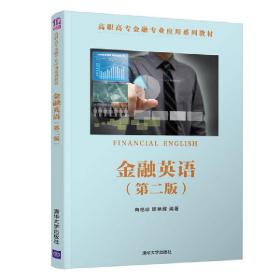
金融英语(第二版)
批量上传,套装书可能不全,下单前咨询在线客服!有特殊要求,下单前请咨询客服!
¥ 17.53 5.9折 ¥ 29.8 全新
库存4件
江西南昌
认证卖家担保交易快速发货售后保障
作者陶艳珍、顾艳辉
出版社清华大学出版社
ISBN9787302501848
出版时间2018-09
装帧平装
开本16开
定价29.8元
货号25344269
上书时间2024-11-01
- 最新上架
商品详情
- 品相描述:全新
- 商品描述
-
前言
在规划编写本书版之前,我们对专业英语教学就有过明确定位,认为专业英语不同于纯粹英语语言教学之处在于,专业英语拥有自成体系的专业内容。基于此,我们将金融学核心的基础知识体系融入教材编写中,按横纵两条线索组织内容,在兼顾英语语言运用的同时,强调金融专业知识内在的完整性和系统性。
再版后的《金融英语》做了以下修订。
(1) 第二版保留了版理论知识部分的编写思路,体例不变,知识点在原有基础上进行适当增删。对版中出现的输入错误进行了修正。
(2) 新增Warmingup Listening,填补了版中听力材料的空白。扫描二维码即可进行听力练习,练习形式包括对话、短文与写句子。听力训练强调在金融实务中运用英语语言的能力,真正做到将语言学习的听、说、读、写四个环节与专业知识的学习有机结合起来。
(3) 为进一步增加学生说英语的机会,改版后的教材删除了每章课前的小短文,增加了Prereading Discussion。根据每一章的知识点,精心设计了三个与实际经济生活息息相关的讨论话题,引导学生主动开口,带着好奇心与兴趣开始每一章专业知识的学习。
(4) 虽然本书主体内容属于金融学基础性的知识体系,不存在过时与否的问题,但为了增强教材的时代感,提升相对晦涩枯燥的专业教材的可读性,我们删除了版中的课后阅读材料,新增了Finance in Our Daily Life专栏,编排了“个人信用评级”(Your Credit Rating)“不要赌汇率”(Dont Bet on Exchange Rates)“你的风险承受度”(Your Risk Tolerance)“典当行”(Pawnshops)“要不要买黄金”(Should You Buy Gold)“为什么通货膨胀对我们不利”(Why Inflation Is Bad for You)“你的超额储备”(Your Excess Reserves)以及“房子是用来住的”(A Home Is a Place to Live)等专业文章。体例清新,界面亲和,让读者能轻松地体验到运用金融专业知识解析不断发展的金融问题和金融现象的乐趣,真正做到学以致用。
改版后的《金融英语》教材,体例、结构更加合理,更加符合年轻人的学习、阅读习惯,能显著提高金融英语课程的教学质量与教学效果。
本书在编写过程中参阅了许多相关书籍与教材,我们以书后参考文献的形式列出,在此表示衷心的感谢。
本书由陶艳珍、顾艳辉编著,本次修订工作由陶艳珍负责。由于编著者学识水平有限,书中疏漏或不妥之处在所难免,恳请各位同仁批评、指正。
编著者
2018年3月
导语摘要
本书注重培养学生运用英语处理金融业务的能力,详细介绍了金融体系与相关知识,包括货币与货币制度、信用、利息与利率、外汇与汇率、金融市场、金融机构、中央银行、货币需求、货币供给与货币政策。本书按横纵两条线索组织内容: 横向线索是货币→信用→金融机构; 纵向线索是货币→货币的需求与供给→货币的均衡与失衡→货币政策。各章节的编排遵循循序渐进的课堂教学规律,从知识结构图开始,依次是学习目标、热身听力、课前讨论、正文、本章小结、生活中的金融学、专业词汇,*后以多种形式的练习结束。各环节环环相扣,层层递进,帮助学生较为扎实地掌握相关金融专业知识和英语语言知识。本书的热身听力内容可扫描二维码收听。本书配有电子教案、习题答案等,如有需要请到清华大学出版社网站(www.tup.com.cn)下载。本书既可以用作高职高专金融类、经济类及相关专业的金融英语课程教材,也可以作为应用型本科院校教学用书,还可以作为金融行业工作人员的英语工具书。
目录
Chapter 1Money and Monetary System
Structure of Chapter 1
Learning Objectives
Warmingup Listening
Prereading Discussion
Text
1.1The Origin and Definition of Money
1.2The Function of Money
1.3The Evolution of Payment System
1.4Monetary System
Summary of Chapter 1
Finance in Our Daily Life
Specialized Vocabulary
Test Yourself
Chapter 2Credit
Structure of Chapter 2
Learning Objectives
Warmingup Listening
Prereading Discussion
Text
2.1An Overview of Credit
2.2The Forms of Credit
Summary of Chapter 2
Finance in Our Daily Life
Specialized Vocabulary
Test Yourself
Chapter 3Interest and Interest Rate
Structure of Chapter 3
Learning Objectives
Warmingup Listening
Prereading Discussion
Text
3.1An Overview of Interest and Interest Rate
3.2Calculation of Interest and Discounting
3.3The Theory of Term Structure of Interest Rates
3.4The Risk Structure of Interest Rates
Summary of Chapter 3
Finance in Our Daily Life
Specialized Vocabulary
Test Yourself
Chapter 4Foreign Exchange and Foreign Exchange Rates
Structure of Chapter 4
Learning Objectives
Warmingup Listening
Prereading Discussion
Text
4.1Introduction to Foreign Exchange and Exchange Rates
4.2Foreign Exchange Market
4.3Theories of Exchange Rate Determination
Summary of Chapter 4
Finance in Our Daily Life
Specialized Vocabulary
Test Yourself
Chapter 5Financial Market
Structure of Chapter 5
Learning Objectives
Warmingup Listening
Prereading Discussion
Text
5.1An Overview of Financial Market
5.2Money Market
5.3Capital Market
5.4Financial Derivatives Markets
Summary of Chapter 5
Finance in Our Daily Life
Specialized Vocabulary
Test Yourself
Chapter 6Financial Institutions
Structure of Chapter 6
Learning Objectives
Warmingup Listening
Prereading Discussion
Text
6.1Economic Basis for Financial Institution
6.2Functions of Financial Institution
6.3Types of Financial Institution
Summary of Chapter 6
Finance in Our Daily Life
Specialized Vocabulary
Test Yourself
Chapter 7The Central Bank
Structure of Chapter 7
Learning Objectives
Warmingup Listening
Prereading Discussion
Text
7.1An Overview of the Central Bank
7.2The Functions of the Central Bank
7.3The Independence of the Central Bank
7.4The Peoples Bank of China
Summary of Chapter 7
Finance in Our Daily Life
Specialized Vocabulary
Test Yourself
Chapter 8Money Demand
Structure of Chapter 8
Learning Objectives
Warmingup Listening
Prereading Discussion
Text
8.1The Implication of Money Demand
8.2The Factors that Determine Demand for Money
8.3Theories of Money Demand
Summary of Chapter 8
Finance in Our Daily Life
Specialized Vocabulary
Test Yourself
Chapter 9Money Supply
Structure of Chapter 9
Learning Objectives
Warmingup Listening
Prereading Discussion
Text
9.1The Quantity of Money Supply
9.2The Mechanism of Money Supply
9.3The Theories of Money Supply
Summary of Chapter 9
Finance in Our Daily Life
Specialized Vocabulary
Test Yourself
Chapter 10Monetary Policy
Structure of Chapter 10
Learning Objectives
Warmingup Listening
Prereading Discussion
Text
10.1The Targets of Monetary Policy
10.2The Instruments of Monetary Policy
10.3The Transmission Mechanism of Monetary Policy
10.4The Potency of Monetary Policy
Summary of Chapter 10
Finance in Our Daily Life
Specialized Vocabulary
Test Yourself
Glossary
Bibliography
内容摘要
本书注重培养学生运用英语处理金融业务的能力,详细介绍了金融体系与相关知识,包括货币与货币制度、信用、利息与利率、外汇与汇率、金融市场、金融机构、中央银行、货币需求、货币供给与货币政策。
本书按横纵两条线索组织内容: 横向线索是货币→信用→金融机构; 纵向线索是货币→货币的需求与供给→货币的均衡与失衡→货币政策。各章节的编排遵循循序渐进的课堂教学规律,从知识结构图开始,依次是学习目标、热身听力、课前讨论、正文、本章小结、生活中的金融学、专业词汇,*后以多种形式的练习结束。各环节环环相扣,层层递进,帮助学生较为扎实地掌握相关金融专业知识和英语语言知识。本书的热身听力内容可扫描二维码收听。本书配有电子教案、习题答案等,如有需要请到清华大学出版社网站(www.tup.com.cn)下载。
本书既可以用作高职高专金融类、经济类及相关专业的金融英语课程教材,也可以作为应用型本科院校教学用书,还可以作为金融行业工作人员的英语工具书。
主编推荐
本书将金融学*核心的基础知识体系融入教材编写中,按横纵两条线索组织内容,在兼顾英语语言运用的同时,强调金融专业知识内在的完整性和系统性。
第二版新增Warming-up Listening,填补了*版中听力材料的空白,扫描二维码即可进行听力练习,练习形式包括对话、短文与写句子,听力训练强调在金融实务中运用英语语言的能力。
根据每一章的知识点,每章课前的Pre-reading Discussion,精心设计了三个与实际经济生活息息相关的讨论话题,引导学生主动开口,带着好奇心与兴趣开始每一章专业知识的学习。
每章课后的Finance in Our Daily Life专栏,编排了“金融投资72法则”“个人信用评级”“不要赌汇率”“我们的风险承受度”“身边的典当行”“要不要买黄金”“为什么通货膨胀对我们不利”“你的超额储备”以及“房子是用来住的”等专业文章。体例清新,界面亲和,让读者能轻松地体验到运用金融专业知识解析不断发展的金融问题和金融现象的乐趣,真正做到学以致用。
精彩内容
Chapter 1Money and Monetary System
Structure of Chapter 1
Learning Objectives
1. To learn the origin and definition of money.
2. To understand how the existence of money facilitates the development of an economy.
3. To understand the functions of money.
4. To grasp the evolution of the payment system.
5. To learn about monetary system, including present Chinas monetary system.
Warmingup Listening
扫描二维码即可开始听力练习。
Directions: Listen to the dialogue carefully and choose the best answer to each question you hear after the dialogue.
1. A. U.S. dollar, pound sterling and Hong Kong dollar.
B. U.S. dollar, pound sterling and Japanese yen.
C. Hong Kong dollar, pound sterling and Japanese yen.
D. U.S. dollar, pound sterling and Deutsche Mark.
2. A. It stands for the European Currency Unit.
B. It stands for the European Currency Union.
C. It stands for English Currency Union.
D. It stands for England Currency Unit.
3. A. 11 B. 13 C. 15 D. 17
4. A. January 1, 1999 B. July 1, 1999
C. January 1, 2002 D. July 1, 2002
5. A. 11 B. 13 C. 14 D. 15
Prereading Discussion
1. Do you want as much money as you can get?
2. Compare money with wealth and income.
3. Imagine what would happen if 10,000 commodities can be produced in a society without money.
Text
1.1The Origin and Definition of Money
1.1.1Market Economy and Exchange Activities
The emergence of money is closely linked to the development of exchange system, and market economy is in fact an economy of exchange. So the study of money should be based on the analysis of market economy.
Historically, the division of labor is prerequisite for the emergence of the market economy. It is because of the natural differences in each persons talent, character and hobby that division of labor occurred. These differences formed each persons feature and determined what one could do, produce or what kind of services one could provide. In the course of social development, people were always not content with the present conditions and often hoped to gain most at the low
相关推荐
— 没有更多了 —


















以下为对购买帮助不大的评价